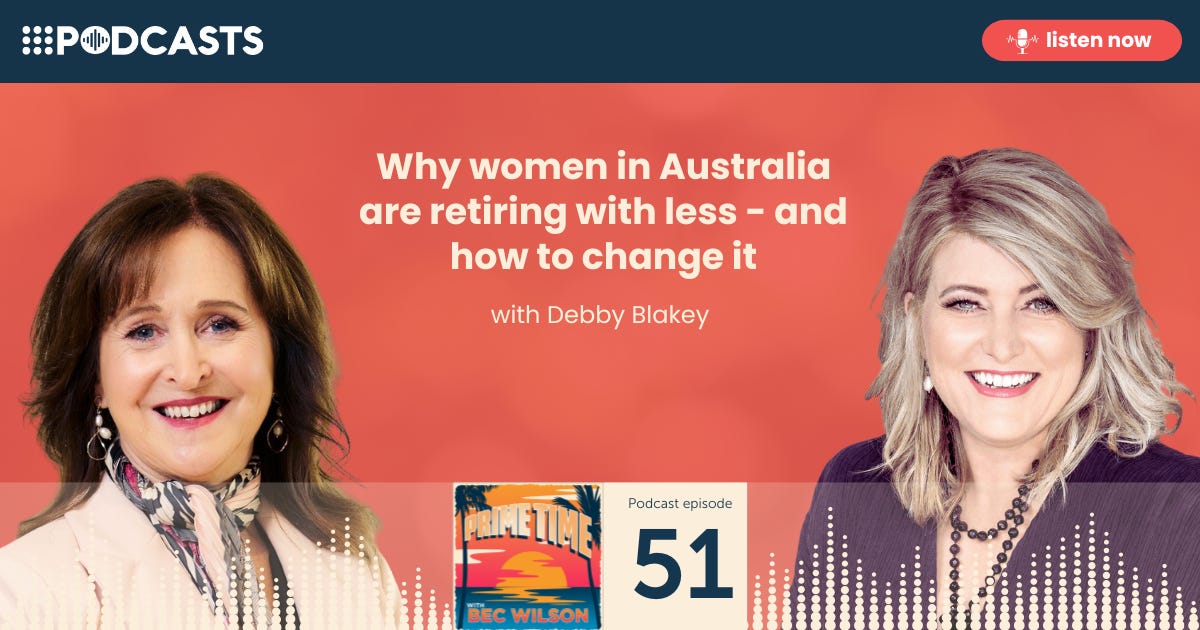Ladies, please take your super seriously
And in today's newspapers 'Retirement is difficult and unaffordable and our funds must step up'
In this edition
Feature: Ladies, please take your super seriously
From Bec’s Desk: 2025 plans all coming together
SMH/TheAge: Retirement is difficult and unaffordable and our funds must step up
Prime Time: Why women in Australia are retiring with less - and how to change it with Debby Blakey
HESTA are the sponsor of this newsletter — and we love their support. Here’s a little message from them to get us started…
HESTA has products and services to help you retire your way
Most people think that their super fund retires when they do. So, they withdraw their money or stop looking for ways to increase its value.
But did you know that keeping your super in your super fund after retirement can continue to generate returns?
With HESTA, our specialised services and products mean your super keeps working, long after you stop. Whether retirement is just around the corner, or still a few years away, HESTA can help you get the most out of your super.
HESTA – Super with impact™. Learn more at hesta.com.au/impact
Ladies, please take your super seriously
And gentlemen - please don’t tune out now.
On average, women retire with about 40% less super than men. If you’re a man — these are your wives, your daughters and your sisters. If you’re a woman — this is your reality! This is a conversation we all need to be part of. Whether you're male or female, the super challenge women face is something that affects us all.
Women’s superannuation matters because, without action, it’s not going to improve. There’s two big issues that cause it…
1. The gender pay gap
According to the latest ASFA data, the average super balance for women at retirement is about $146,000, while men have $182,000. Why the gap? It’s for a couple of reasons: women still, in 2024, earn less—around 14% less on average—than men.
How do we fix it? The obvious solution is equal pay for equal work. Addressing the gender pay gap is key in ensuring women have the same financial opportunities, not just during their working years, but when building super for retirement.
2. The burden of caregiving
There’s also a social reality that women are more likely to take time off work to care for children or aging parents, which means less super is being contributed during these breaks. Women spend an average of 3.3 years out of the workforce raising children, and often return to lower-paying or part-time jobs, making it harder to build their super. On top of that, many women take on unpaid care work, further limiting their earning potential and super contributions.
How do we fix it? The 2024 introduction of superannuation contributions during maternity leave is a good start, but it only covers the official leave period, not the unpaid caregiving that many women take on for much longer. On the Prime Time podcast, Debby Blakey called for caregiver tax concessions to level the playing field. This is a conversation we need to push further with our politicians.
The other thing we can do is get practical — More on that below.
Practical steps we can all take help close the gap
So, what we do to ensure women aren’t disadvantaged? The good news is there are steps we can all take to help set ourselves up for a stronger financial future. Some are everyday steps - some need some real change.
Encourage loved ones to contribute to super during career breaks
I know, it sounds a bit wild to ask a woman to contribute to her super while she’s already sacrificing salary and time to care. But trust me, every little bit counts. If you’re earning less during a break, you might become eligible for the Superannuation Co-Contribution Scheme or the Low Income Superannuation Tax Offset (LISTO), which can help boost your super when you need it most. Even small contributions can make a big difference in the long run.
Another option to look into is the government’s Spouse Contribution Scheme, which allows your partner to contribute to your super during career breaks. It’s a great way to help boost your super when contributions are limited.
Superannuation Co-Contribution Scheme
For the 2024–25 financial year, the government will match personal (after-tax) contributions to your superannuation up to a maximum of $500. To be eligible, your total income must be $45,400 or less. If your income is between $45,400 and $60,400, you may receive a partial co-contribution. Once your income exceeds $60,400, you are not eligible for the co-contribution.
Low Income Superannuation Tax Offset (LISTO)
LISTO provides a tax offset equal to 15% of your concessional (before-tax) contributions, up to a maximum of $500 per year. To qualify, your income must be $37,000 or less. This offset is paid directly into your superannuation fund.
Consider salary sacrificing
If possible, salary sacrificing is an easy way to increase your super contributions and take advantage of tax breaks. It’s a simple step that can make a big difference over time.
Understand how your super is invested
If you could have 25-30 years of life ahead after retirement, it’s crucial to ensure your super is invested wisely. Investment experts recommend holding some of your portfolio in growth assets, like shares or property, to achieve strong, long-term returns. This helps ensure your super continues to grow and provides financial security during retirement. If you haven’t reviewed how your super is invested—do it now. Make sure it aligns with your retirement goals.
Remember, women often live longer than men, so be prepared
In Australia, women tend to live longer than men and may spend more of those years in poor health. That makes it even more important to be proactive about your financial future. Don’t wait—take control of your financial literacy and make sure you can manage your financial situation independently.
Ensure you have a credit rating
Many women head into retirement as the secondary cardholder on a credit card held in their partner’s name. The problem? This can create serious difficulties if you find yourself without access to funds later in life. Many banks won’t offer credit cards to retirees, even with a steady income from super or the age pension.
The solution? Apply for a fee-free credit card before you retire, and make sure you are listed as the primary cardholder. This ensures you have financial independence and flexibility in your later years. And make sure your name is on the bank accounts as an equal owner.
Encourage your daughters to start their superannuation early
We all know how powerful compound investing is. Encourage your daughters to start contributing to their super as early as possible—even small amounts at first. The earlier they start, the more their money will grow over time, giving them a strong financial foundation for their later years, even if they do take a few years out to care for her loved ones.
Be a lobbyist for change
One of the best things you can do is advocate for change. While individual actions matter, collective efforts are needed to create systemic improvements. Speak up about the issues women face with superannuation—whether in your workplace, community, or with your elected representatives. Advocate for policies that support women’s financial security, such as equal pay for equal work, tax incentives for caregiving, and reforms to ensure women are not disadvantaged in retirement.
By pushing for these changes, we can help create a more equitable system.
So, what are you waiting for — start by opening your super app and having a look at your balance. I put the benchmarks for how much women have versus men on our Prime Time newsletter this week — have a look here if you want to check yours.
Order signed copies of How to Have an Epic Retirement for gifting season
You can now purchase a signed copy of How to Have an Epic Retirement. I’ve popped up an Australian online store where you can order your copy and get it in time for Christmas gift giving. It’s something I love to do.
If you’re a corporate and want to give signed copies as gifts - we’ve got a ‘bulk deal’ too. (Or don’t hesitate to contact me by email for larger bulk options).
Our Summer Edition of The Epic Retirement Flagship Course is wrapping up this week! Nearly 200 students have joined us for six weeks of epic education, six live Q&As with some of the most interesting and expert guests, and the rave reviews are flooding in as they complete the final week’s program. (Thank you everyone!) It’s been such a rewarding experience - again! I absolutely love running this course.
Our next program will kick off in February 2025. I’ll be putting it on sale before Christmas knowing some want to lock in their place. There will be four scheduled programs in 2025.
We’re also offering the program to larger corporates—either to pay for individual places for their team members to come along or, if their teams are large enough, to run exclusive programs for their employees. So, if you’re part of a big organisation with lots of pre-retirees, give your HR team a nudge and let them know to give me a call.
You can register your interest for our upcoming programs here — so you get notified when the 25% off early bird pricing drops. The dates are now available for our Feb-March ‘25 and April-June ‘25 programs.
—
Last week we agreed on the cover of my next book - Prime Time!! It’s really coming together. The retail launch date has been set for 28th June 2025. So the countdown begins. The editor is hard at work pouring over the text. I’ve now launched into work on the International edition of How to Have an Epic Retirement. It’s rather fascinating to explore each of the UK, US, Canadian and New Zealand systems and how they fit within the six pillars of an epic retirement.
Next week I’ll take a break from writing to head down to the Association of Superannuation Funds of Australia National Conference in Sydney - to learn from all the experts. I’ll report back with the interesting stuff in next week’s newsletter for sure. (I’ll leave out the boring bits! 😎)
And in just two weeks I’ll be keynoting the Women in Super Christmas Party - so if you’re part of the industry - make sure you come along, and be sure to say hi after the official stuff is done. Tickets here.
—
I have a big request - we want to do an edition of the Prime Time podcast about your Epic Retirements - and how you’ve made changes in your life. I’d love you to send me a letter we can read out - or even record a voice message we can play and send it in. 🏝️ Tell us your stories 🏝️. We’re going to feature these stories in the podcast - and do features in the Epic Retirement Club Facebook Group too. email me at bec@epicretirement.com.au. I can’t wait to read it!
—
Finally, if you’re planning retirement education sessions for 2025, keep me in mind. I love the guest speaking and educating in person part of my work. It offers a direct contrast to sitting behind this computer educating in writing and on video - and it gives me the perfect balance. Want me to speak or educate somewhere? Email me.
—
As you’re reading this, I’ll be waving my 21 year old daughter off for Canada again - hopefully only for the Canadian winter this time not for a whole year. It’s been wonderful having her home for 8 short weeks. I’m not ready to become an empty nester yet. Although I will enjoy one less person’s laundry in the house.
Until next week - make it epic!
Many thanks! Bec Wilson
Author, podcast host, columnist, retirement educator, and guest speaker
Retirement is difficult and unaffordable and our funds must step up
Extract of article published in print in The Age, The Sydney Morning Herald, Brisbane Times, WA Today on Sunday 17th November 2024.
It’s time to confront some hard truths – retiring looks difficult and unaffordable for many Australians right now.
The 2024 Brighter Super & Investment Trends Retirement Income Report came out this week, and it paints a sobering picture: retirement preparedness is at its lowest point in a decade.
Almost half of pre-retirees feel unprepared, and the gap between expected and needed retirement income has widened to a staggering 31 per cent, or an average shortfall of $1300 a month. It’s shocking data – and it should call our system to attention.
And if you’re a pre-retiree approaching retirement and feel concerned – know you’re not alone out there.
We’ve known for years that retirement is complex, but the 2024 edition of this report, backed by over a decade of longitudinal data, shows just how much the ground has shifted. Inflation and cost-of-living pressures are weighing heavily on both retirees and pre-retirees, with inflation now the top concern for those approaching retirement, and health the primary worry for retirees. For anyone nearing retirement, this financial landscape is downright unsettling.
While satisfaction with super funds is relatively high (59 per cent among pre-retirees and 71 per cent among retirees), the report highlights a critical issue: too many Australians lack access to the advice and guidance they need.
We have a system where confidence is falling, advice gaps are widening, and too many Australians are drifting toward retirement uncertain.
Four out of five pre-retirees report gaps in retirement planning knowledge, superannuation growth, and investment strategies – something that could be helped with both education and advice. Even more troubling, half of fund members are unaware that their super fund offers financial advice, and two-thirds don’t know if their fund provides pension products.
This article continues — Read on, in The Age, The Sydney Morning Herald, Brisbane Times and WA Today.
Why women in Australia are retiring with less - and how to change it with Debby Blakey
Today, we’re tackling a crucial and challenging topic—how women are retiring with less, and what we can do to change that. I’m joined by Debby Blakey, CEO of HESTA, a strong advocate for women in the workplace and for equality in superannuation. Together, we dive into the big issues women face today and look at the practical steps we can take to plan for a secure retirement, like finding the right advice, using the right resources, and making smart super decisions.
We also get into the deeper issues that hold women back in retirement savings, and what we can all do to drive real change. This conversation is both practical—offering things women can start doing now to build their retirement security—and visionary, as we explore ways to make sure women are better valued for the roles we play both in the workplace and at home.
LISTEN TO THIS EPISODE OF THE PODCAST HERE:
Last of all, if you haven’t read the book, you can order your copy from Amazon online and Big W online too. Or pick up a copy at your local Big W, or QBD stores.














